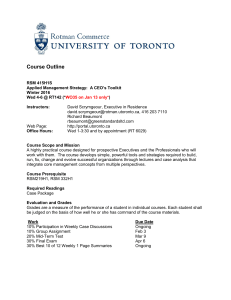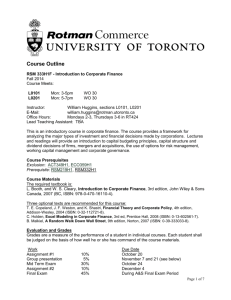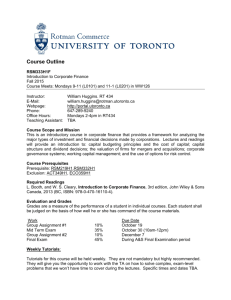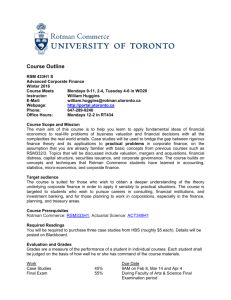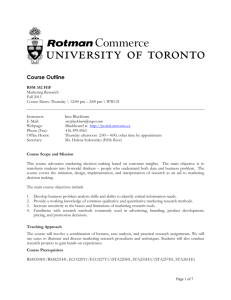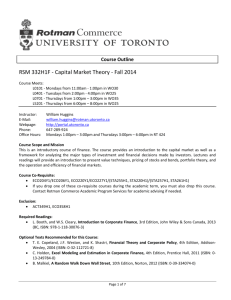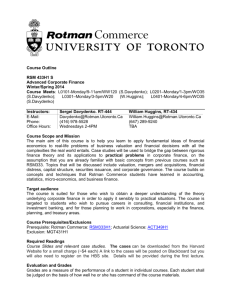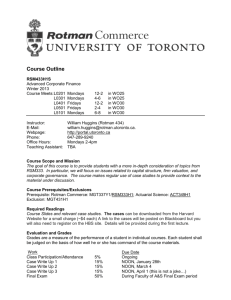L0201, L0301, + L0401 - University of Toronto
advertisement
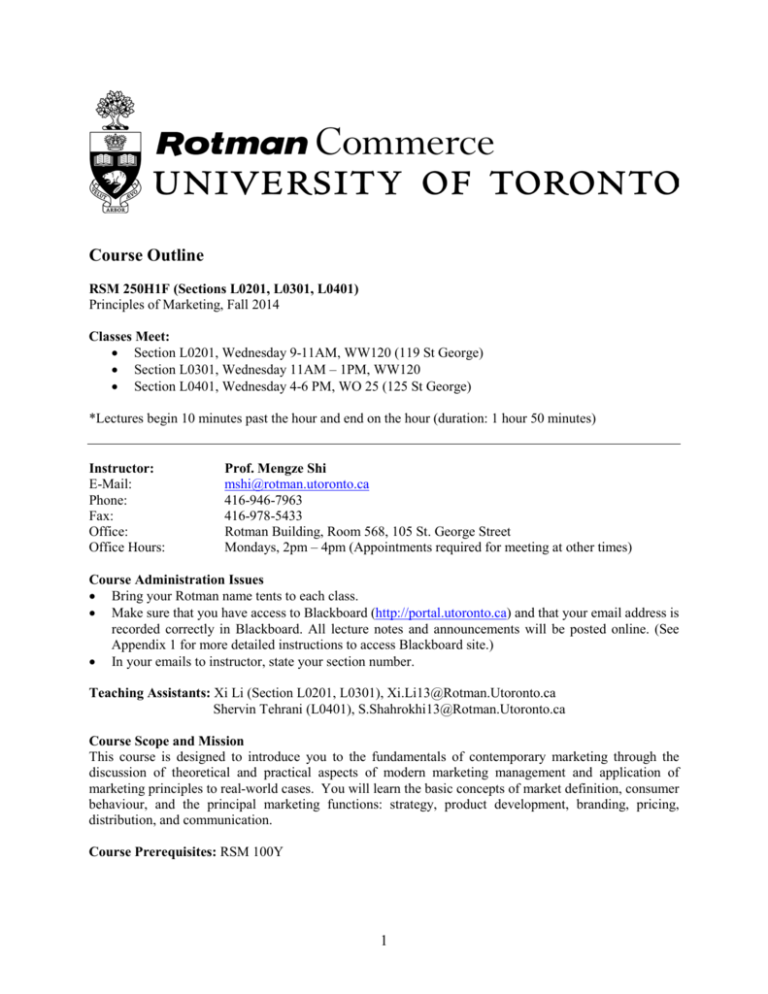
Course Outline RSM 250H1F (Sections L0201, L0301, L0401) Principles of Marketing, Fall 2014 Classes Meet: • Section L0201, Wednesday 9-11AM, WW120 (119 St George) • Section L0301, Wednesday 11AM – 1PM, WW120 • Section L0401, Wednesday 4-6 PM, WO 25 (125 St George) *Lectures begin 10 minutes past the hour and end on the hour (duration: 1 hour 50 minutes) Instructor: E-Mail: Phone: Fax: Office: Office Hours: Prof. Mengze Shi mshi@rotman.utoronto.ca 416-946-7963 416-978-5433 Rotman Building, Room 568, 105 St. George Street Mondays, 2pm – 4pm (Appointments required for meeting at other times) Course Administration Issues • Bring your Rotman name tents to each class. • Make sure that you have access to Blackboard (http://portal.utoronto.ca) and that your email address is recorded correctly in Blackboard. All lecture notes and announcements will be posted online. (See Appendix 1 for more detailed instructions to access Blackboard site.) • In your emails to instructor, state your section number. Teaching Assistants: Xi Li (Section L0201, L0301), Xi.Li13@Rotman.Utoronto.ca Shervin Tehrani (L0401), S.Shahrokhi13@Rotman.Utoronto.ca Course Scope and Mission This course is designed to introduce you to the fundamentals of contemporary marketing through the discussion of theoretical and practical aspects of modern marketing management and application of marketing principles to real-world cases. You will learn the basic concepts of market definition, consumer behaviour, and the principal marketing functions: strategy, product development, branding, pricing, distribution, and communication. Course Prerequisites: RSM 100Y 1 Required Readings • • • There is NO textbook for this course. All readings are from Course Package. Couse Package (RSM250H1F, Principles of Marketing, Fall 2014 Course Packet - Prof. Mengze Shi/Spike Lee) is available at the University of Toronto bookstore. You are expected to read each week’s assigned articles before that week’s lecture. Course Package includes the following contents: Readings: 1. “Marketing Research,” by Robert J. Dolan (1991), #9-592-034, Harvard Business School. 2. “Questionnaire Design and Development,” by Alvin J. Silk (1990), #9-590-015, Harvard Business School. 3. “Market Segmentation, Target Market Selection, and Positioning,” by Miklos Savary and Anita Elberse (2006), #9-506-019, Harvard Business School. 4. “Brand Positioning Statements,” by Gerry Yemen and Ronald Wilcox (2012), UV5792, Darden Business Publishing, University of Virginia. 5. “Principles of Product Policy,” by Anita Elberse (2006), #9-506-018, Harvard Business School. 6. “Marketing Communications,” by Thales Teixeira (2012), #9-513-041, Harvard Business School. 7. “Principles of Pricing,” by Robert J. Dolan and John. T. Gourville (2009), #9-506-021, Harvard Business School. 8. “The Pricing Formula,” by Dilip Soman, Rotman School of Management. 9. “Note on Behavioral Pricing,” by Robert J. Dolan and Hermann Simon, #9-599-114, 1999, Harvard Business School. 10. “Designing Channels of Distribution,” by Robert Spekman (2009), UV2969, Darden Business Publishing, University of Virginia. Cases 1. “Ikea Invades America,” by Youngme Moon (2004), Case #9-504-094, Harvard Business School. 2. “Facebook,” by Mikolaj Piskorski, Thomas Eisenmann, and Aaron Smith (2014), Case #9-808-128, Harvard Business School. 3. “Biopure,” by John Gourville (1990), Case #9-598-150, Harvard Business School. 4. “Clean Edge Razor: Splitting Hairs in Product Positioning,” by John Quelch and Heather Beckham (2011), Case #4249, Harvard Business School. 2 Learning Activities, Evaluation, and Grades Each student shall be judged on the basis of how well he or she has command of the course materials. Note that some of the questions you will be asked do not have a specific right answer; therefore, some of the grading is necessarily subjective. 1) 2) 3) 4) 5) 6) Class participation Research Requirement Group Case Report Group Case Presentation Mid Term Exam Final Exam Total Weight 10% 3% 12% 5% 30% 40% 100% Due Date Ongoing see “Research Requirement” below Nov 18, 2014 Nov 19 & Nov 26, 2014 Oct 8, 2014 (4-6PM) During the Final Exam Period Students may be required to submit their “Case Discussion Paper” to www.turnitin.com for a review of textual similarity and detection of possible plagiarism. In doing so, students will allow their essays to be included as source documents in the Turnitin.com reference database, where they will be used solely for the purpose of detecting plagiarism. The terms that apply to the university’s use of the Turnitin.com service are described on the Turnitin.com website. 1. Class Participation You are expected to prepare thoroughly and make every effort to attend every class. Given its very nature, the learning and quality of a marketing class are directly related to your willingness and ability to contribute to the class discussions. Please feel free to raise an opinion or offer an analysis no matter how different it is from the emerging theme in the classroom, or how unusual it may be. However, focus on quality and not on quantity while contributing to the discussion. Also, civility and respect for others’ opinions are important attributes to possess in the give and take of classroom debate. In general, your contribution will be evaluated on the following: Thoughtful responses, Understanding and analysis of topic, Idea generation, Promotion of further discussion. By default, every student who attends classes will receive 6 (out of 10) points for class participation. If you make significant contributions to class discussions, you may receive more than 6 points. On the other hand, if you miss classes or consistently make non-constructive comments, you may receive fewer than 6 points. 2. Research Requirement You are required to participate in three research studies to earn 3% toward your course grade. The research requirement in this course is intended to supplement the material on marketing and organizational behaviour that you encounter in your courses by giving you more direct exposure to research in marketing and organizational behaviour. To participate in research studies, sign-up for an account online at http://rotman-credit.sona-systems.com. Participation in the actual research study will take between 45 and 60 minutes. More detailed instructions on study participation and alternatives will be given in class and posted in Blackboard. 3 3. Group Case Report The purpose of this project is for you to apply the knowledge learned in class to real-world marketing problems. You will follow a case analysis template that will be given to you by the instructor. When discussing your case, keep in mind that both creativity and the actual problem solution matter. There are two cases to choose from: “Biopure” and “Clean Edge Razor”. Half of the class will work on one case, another half on the other case. The assignment to a case will be based on a first-come first-served basis. You must work in groups of 4~6 students for this project. All group members in each group must be in the same section. You have to email TA about your group/members and your case preference by Oct 13. Students who have not formed a group by Oct 20 will be assigned to a group by the TA. Thereafter, students will not be able to switch groups. Similarly, groups that have not chosen a case will be assigned to a case by the TA. Thereafter, groups will not be able to switch cases. Please note that clear, concise, and correct writing will be considered in the evaluation of the case discussion paper. That is, you may lose points for writing that impedes communication: poor organization, weak paragraph development, excessive wordiness, hard-to-follow sentence structure, spelling mistakes and grammatical errors. Students who require additional support and/or tutoring with respect to their writing skills are encouraged to visit the Academic Success Centre (www.asc.utoronto.ca) or one of the College Writing Centres (www.writing.utoronto.ca/writing-centres). These centres are teaching facilities – not editing services, where trained staff can assist students in developing their academic writing skills. There is no charge for the instruction and support. • Group case report (in PDF file) is due on Nov 18 (before 7PM). No late submissions will be accepted. (I strongly encourage you to aim at finishing the final write-up one week before the deadline.) No hard copy is required. • Each student should email TA a peer evaluation form by Nov 18. (No hard copy is required.) The peer-evaluation is conducted to ensure that all students do their fair share of the work. 15% of your grade for the case report is based on this peer evaluation. You need to provide a peer evaluation for every member of your group (excluding yourself), rate your peer’s contributions, using a scale of 0 (lowest) to 5 (highest). Suppose your group has four people (including yourself), and that you receive 4, 4, and 5. Your average peer evaluation score will be (4+4+5)/3 = 4.33. Your final score for the term project will be (4.33/5)*15 + (term project score/100)*85. A student who does not submit a peer review will receive a zero for his/her peer review grade. 4. Group Case Presentation Each group has to present its case analysis in front of the entire class on Nov 19 or Nov 26, depending on case selection. Each group member has to participate in the presentation. The time allocation of each presentation is approximately 12 minutes + 3 minutes for Q&A. Each group must submit electronic copies of their presentation—a PowerPoint file or a PDF version —to the TA via email by 7pm of Nov 18. Group Work Learning to work together in teams is an important aspect of your education and preparation for your future careers. That said, project-based teamwork is often new to students and you are therefore reminded of the following expectations with respect to behaviour and contributions to your team project. 1. Read the document entitled, “Working in Teams: Guidelines for Rotman Commerce Students” which is available on the RC portal under the Academic Services tab. 4 2. When working in a team, Rotman Commerce students are expected to: • • • • • Treat other members with courtesy and respect; Honour the ground rules established by the team; Contribute substantially and proportionally to the final project; Ensure enough familiarity with the entire contents of the group project/assignment so as to be able to sign off on it as original work; Meet the project timeline as established by the team. 3. Resolving conflicts: Conflicts are part of the team’s process of learning how to work together effectively and when handled well can generate creativity and bring-multiple perspectives to the solution. Student teams are collectively expected to work through their misunderstandings as soon as they arise (and prior to submission of the final project). In cases where teams are unable to arrive at a solution that works for all members, the team must meet with the Rotman Commerce Team Coach** as soon as possible. The Coach will listen to the team and help develop options for improving the team process. All members of the project team must commit to, and, utilize their action plans. ** For an appointment with a Rotman Commerce Team Coach, please contact Nikoleta Vlamis at nikoleta@nikoletaandassociates.com or Elaine Zapotoczny at elaine@nikoletaandassociates.com. Nikoleta and Elaine are highly skilled at facilitating team dynamics and collaboration. Note that the Team Coach’s s role is to provide guidance, support and advice on team matters – not to formally evaluate or assess teamwork for academic purposes. 5. & 6. Mid-Term and Final Examination These will be closed book tests that cover material from the lectures, cases, and assigned readings in the course packet. The midterm will be held on Oct 8 (4 – 6PM @ EX 100 of Exam Centre) for all 3 sections. The midterm and final exams may consist of multiple choice questions, short-answer and essay questions. The final will be held during the final examination period. The final exam will be cumulative (cover the content of the entire semester). Missed Tests and Assignments (including midterm examinations) Students who miss a test or assignment for reasons entirely beyond their control (e.g. illness) may submit a request for special consideration. Provided that notification and documentation are provided in a timely manner, and that the request is subsequently approved, no academic penalty will be applied. In such cases, students must notify Rotman Commerce on the date of the missed test (or due date in the case of course work) and submit supporting documentation (e.g. Verification of Student Illness or Injury form) to the Rotman Commerce Program Office within 48 hours of the originally scheduled test or due date. Students who do not provide Rotman Commerce or the instructor with appropriate or sufficient supporting documentation will be given a grade of 0 (zero) for the missed test or course deliverable. Note that the physician’s report must establish that the patient was examined and diagnosed at the time of illness, not after the fact. Rotman Commerce will not accept a statement that merely confirms a report of illness made by the student and documented by the physician. 5 There will be no make-up midterm test. If the documentation is satisfactory, the weight of the midterm test will be moved to the final exam (i.e., the final exam will carry 70% instead of 40%). Course Work & Academic Integrity Academic Integrity Academic Integrity is a fundamental value essential to the pursuit of learning and scholarships at the University of Toronto. Participating honestly, respectively, responsibly, and fairly in this academic community ensures that the UofT degree that you earn will continue to be valued and respected as a true signifier of a student's individual work and academic achievement. As a result, the University treats cases of academic misconduct very seriously. The University of Toronto’s Code of Behaviour on Academic Matters http://www.governingcouncil.utoronto.ca/policies/behaveac.htm outlines the behaviours that constitute academic misconduct, the process for addressing academic offences, and the penalties that may be imposed. You are expected to be familiar with the contents of this document. Potential offences include, but are not limited to: In papers and assignments: • Using someone else's ideas or words without appropriate acknowledgement. • Submitting your own work in more than one course without the permission of the instructor. • Making up sources or facts. • Obtaining or providing unauthorized assistance on any assignment (this includes collaborating with others on assignments that are supposed to be completed individually). On test and exams: • Using or possessing any unauthorized aid, including a cell phone. • Looking at someone else's answers • Misrepresenting your identity. • Submitting an altered test for re-grading. Misrepresentation: • Falsifying institutional documents or grades. • Falsifying or altering any documentation required by the University, including (but not limited to), medical notes. All suspected cases of academic dishonesty will be investigated by the following procedures outlined in the Code of Behaviour on Academic Matters. If you have any question about what is or is not permitted in the course, please do not hesitate to contact the course instructor. If you have any questions about appropriate research and citation methods, you are expected to seek out additional information from the instructor or other UofT resources such as College Writing Centres or the Academic Success Centre. Students are expected to conduct themselves with the utmost integrity during their time at the University of Toronto and, without limiting the foregoing, will: Maintain an optimal learning and work environment for themselves and others (cooperation, keeping commitments, attendance, on-time arrival, preparation in advance, participation and non-disturbance during classes) Submit only original work, giving credit to others where appropriate; Neither give nor receive unauthorized aid in examinations or on assignments; Contribute substantially and proportionally to each group assignment; Ensure enough familiarity with the entire contents of group assignments so as to be able to sign off on them as original work; 6 Accept and acknowledge that assignments found to be plagiarized in any way will be subject to sanctions under the University’s Code of Behaviour on Academic Matters; Represent themselves honestly to members of the Rotman Commerce community and to outsiders; Represent Rotman Commerce appropriately to the outside world, and act as professionals (integrity, deportment, reasonableness and respect). During class, please turn off your cell phone. If you need to be reachable via cell phone during class due to exceptional circumstances, please ensure that your cell phone is set to vibrate and take calls outside of the classroom. Remarking requests for term tests & assignments (excluding the final examination): Requests to have mid-term tests and assignments remarked will be considered if the following conditions are met: a) the test/assignment is submitted to the instructor no later than four weeks after the marked test/assignment has been made available to the student; b) the student submits with his/her request a written explanation as to why and where he/she believes he is entitled to more marks; and c) the instructor has no reason to believe the student has made any changes subsequent to the test/assignment being returned. Students should be aware of the following: • Several tests/assignments are randomly photocopied before being returned; • Items submitted for remarking will be remarked in their entirety and the mark awarded may increase, decrease, or remain the same. Remarking requests for the final exam After the issue of final results and within six months of the final examination period, a student may request from the Office of the Faculty Registrar (Room 1006, Sidney Smith Hall) a reproduction of his/her final examination. If, upon inspection, the student wishes to have the paper reread, s/he must set down reasons in detail and petition through their College Registrar within six months of the final examination period. Students should note that in cases where a failing grade is issued, examinations must be reread before the marks are reported. Instructors may not subsequently reread any final examination except on the authority of a petition, which must outline specific instances of disagreement with the existing grading and an indication of the grounds for such disagreement. Accessibility Needs The University of Toronto is committed to accessibility. If you require accommodations for a disability, or have any accessibility concerns about the course, the classroom or course materials, please contact Accessibility Services as soon as possible: disability.services@utoronto.ca or http://www.accessibility.utoronto.ca/. Recording Lectures Lectures and course materials prepared by the instructor are considered by the University to be an instructor’s intellectual property covered by the Canadian Copyright Act. Students wishing to record a lecture or other course material in any way are required to ask the instructor’s explicit permission, and may not do so unless permission is granted (note: students who have been previously granted permission to record lectures as an accommodation for a disability are, of course, excepted). This includes tape recording, filming, photographing PowerPoint slides, Blackboard materials, etc. If permission is granted by the instructor (or via Accessibility Services), it is intended for the individual student’s own study purposes and does not include permission to “publish” them in anyway. It is 7 absolutely forbidden for a student to publish an instructor’s notes to a website or sell them in any other form without formal permission. 8 Tentative Weekly Schedule (All Cases and Readings in Course Package) Date # Topics Cases and Readings Sep 10 1 Introduction: The Scope of Marketing • Sep 17 2 Understanding Consumer Behavior • “Marketing Research” • “Questionnaire Design and Development” Review Course Outline • Sep 24 3 Oct 1 4 Oct 8 5 • “Market Segmentation, Target Market Selection, and Positioning” “Brand Positioning Statements” • “Principles of Product Policy” Segmentation, Targeting, and Positioning Products and Brands MIDTERM For All 3 Sections (4-6PM EX 100 @ Exam Center) (Conflict sitting: HA 401, 2 – 4PM @ Haultain Building) Oct 13 Deadline: Email to TA your group forms (Group members, Case Selection) Oct 15 6 Marketing Communication • “Marketing Communications” • • • • “Principles of Pricing” “The Pricing Formula” “Note on Behavioral Pricing” “Designing Channels of Distribution” Oct 22 7 Distribution and Pricing Oct 29* 8 Case Discussion 1: Ikea • “Ikea Invades America” Nov 5* 9 • Case Discussion 2: Facebook • Course Review • “Facebook” Nov 12* 10 Guest speaker By Nov 18, 7PM: Email TA your presentation (Powerpoint or PDF), case report (PDF), and peer evaluation (PDF) files Nov 19 11 • Nov 26 12 • FINAL EXAM Presentation I: Biopure Presentation II: Clean Edge • • “Biopure” “Clean Edge Razor” SCHEDULED BY REGISTRAR’S OFFICE (DEC 8 ~19) *Guest speaker session may take place on one of these three days, depending on speaker’s availability. 9 Appendix 1: Access to Blackboard Course Site Logging into the Course Website To access the course website, go to: http://portal.utoronto.ca and log in using your UTORid and password. If you need information on how to activate your UTORid and set your password for the first time, please go to www.utorid.utoronto.ca Once you have logged in to the portal using your UTORid and password, look for the My Courses box, where you’ll find the link to your course websites. If you don't see the course listed here but you are properly registered for the course in ROSI, wait 48 hours. If the course does not appear, come to the library for help. Email At times, the course instructor may decide to communicate important course information by email. As such, all UofT students are required to have a valid UTmail+ email address. You are responsible for ensuring that your UTmail+ email address is set up AND properly entered on the ROSI system. For more information please visit http://help.ic.utoronto.ca/category/3/utmail.html Forwarding your utoronto.ca email to a Hotmail, Gmail, Yahoo or other type of email account is not advisable. In some cases, messages from utoronto.ca addresses sent to Hotmail, Gmail or Yahoo accounts are filtered as junk mail, which means that important messages from your course instructor may end up in your spam or junk mail folder. 10
